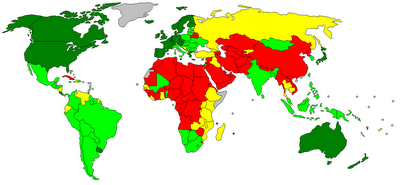Perhaps one of the more interesting and relevant reports to come out this week has been the 2007 update of "Freedom in the World", released annually by the think-tank Freedomhouse. They have been gathering information on political and civil freedoms across the world since 1972. The following is a self-made map cataloguing the status of freedom this year (Green covers the "Free" states, Yellow "Partly Free" and Red "Not Free").
 A major theme this year is how the number of countries in each status has remained approximately the same in the past 15 years or so (although the number of free countries is much higher than, say, in 1981, largely owing to political developments in Eastern Europe, Latin America, Southern Africa and East Asia).
A major theme this year is how the number of countries in each status has remained approximately the same in the past 15 years or so (although the number of free countries is much higher than, say, in 1981, largely owing to political developments in Eastern Europe, Latin America, Southern Africa and East Asia).You can check out the report for an explanation of their methodology and scores. Their compiled comparative data can be seen here. I confess that playing with this information was a passtime of mine in whiling away the long hours in Peace Corps.
It is interesting to compare the scores with the Economist Intelligence Unit's new Democracy Index Survey. Their ratings of countries is a bit more graded, and as a result a great deal fewer countries get to stand next to Sweden and FInland near the top. Here is a self-made map of their results (Dark green for Full Democracy, Light Green for Flawed Democracy, Yellow for Hybrid Regime and Red for Authoritarian Regime).

Some similarities, some differences. Nevertheless, one can see that, as mentioned above, Latin America, Eastern Europe, Southern (and parts of Western) Africa, and parts of East Asia are seeing some political gains. Much of the rest of the world is not, or is in some sort of quasi-authoritarian limbo (but much less of it ruled by military regimes or one party states than before 1991). And, despite all the best efforts of its populace and leaders to the contrary, North America, Western Europe, Japan and Australasia still rank at the top of the list. As they say, democracy is the worst form of government, except for all the others. Maybe that is the scariest lesson!